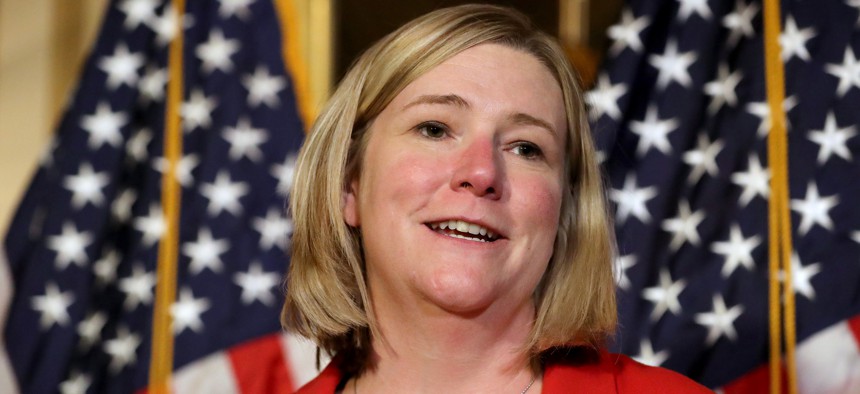Is This the Year for Two-woman Tickets?

GettyImages/ Chip Somodevilla
Ohio Democrats this week picked women as their nominees for governor and lieutenant governor. Other voters could follow suit in a year when more women are running to lead their states.
Originally published by The 19th
A record number of women could end up running together as nominees for governor and lieutenant this November, signaling shifting perceptions about women’s electability.
Nan Whaley won the Democratic nomination for Ohio governor Tuesday night alongside Cheryl Stephens, her running mate for lieutenant governor. In at least 13 states, women are running for both governor and lieutenant governor this year, according to a preliminary tally by the Center for American Women and Politics. Additional primary races this month could set up more two-woman tickets for the general election — and if one is successful, it will be the first time in U.S. history that voters have elected two women to a state’s top two executive spots,
“I think the fact that we’re looking at multiple all-female tickets for governor and lieutenant governor is extraordinary,” said Erin Loos Cutraro, the founder and CEO of She Should Run, a nonpartisan nonprofit that encourages women to run for office. “It tells us how far we’ve come. It tells us to be hopeful for the future.”
Limited information is available on the number of women who have run concurrently for governor and lieutenant governor during a primary, and the data carries a caveat: Two-woman tickets are not always intentional. In some states, candidates for the top two posts run together on a ticket in both the primary and general, in some they’re separate, and in some candidates run separately during the primary and together on a ticket for the general election. In six elections since 2000, two women have run from the same major party for lieutenant governor and governor, but not as a ticket; none were successful.
In Ohio, Whaley and Stephens appeared on the primary ballot together. Whaley, a former mayor of Dayton, and Stephens, who is an organizer and former mayor, will go up in November against Republican Gov. Mike DeWine, who won a crowded primary Tuesday, and his running mate, current Lt. Gov. Jon Husted.
Whaley and Stephens’ primary win means 2022 already matches the record for the number of gubernatorial tickets with women running on a ticket together. In the past 30 years, there has never been more than one in a general election:
- Democrats Dawn Clark Netsch and Penny Severns in Illinois in 1994
- Republicans Peppy Martin and Wanda Cornelius in Kentucky in 1999
- Democrats Barbara Buono and Milly Silva in New Jersey in 2013
- Democrats Susan Wismer and Susan Blake in South Dakota in 2014
- Republicans Andria Tupola and Marissa Kerns in Hawaii in 2018
All lost. In at least one instance, the candidates did not intend to run together. Tupola and Kerns ran separately in their primary but then together on a ticket in the general election. (That dynamic sometimes caused friction between the two.)
At least one all-woman ticket could happen unintentionally this year. In Arkansas, which holds its primary May 24, Republican Sarah Huckabee Sanders is the party’s presumptive nominee for governor. Republican Leslie Rutledge, the state’s current attorney general, is in a crowded race for lieutenant governor that could go into a runoff. The winners of the GOP primary in the conservative-leaning state are likely to be elected in November.
In Georgia, also holding primaries May 24—and which, like Arkansas, has never elected a woman governor—Democrat Stacey Abrams faces no challengers within her party as she makes another bid for governor. The race for the number two spot is crowded, but among the candidates is state Rep. Renitta Shannon, a Black woman and the only Democratic woman. Abrams has not weighed in on the lieutenant governor’s race, which could go into a runoff if no candidate gets more than 50 percent of the vote. Shannon is seeking to run alongside Abrams, who could become the first Black woman ever elected governor in any U.S. state.
Christine Matthews is a pollster who has studied women’s candidacies and worked in gubernatorial races in the past, including that of Republican Maryland Gov. Larry Hogan. She noted that since at least the 1980s, there has been a model for the two-person ticket for governor and lieutenant governor: A man runs for governor and, increasingly, chooses a woman as his running mate.
This is reflected in the data. While just nine women currently serve as governors, 19 serve as lieutenant governors, a position that can vary widely in responsibilities and is sometimes largely a ceremonial role. More women of color are serving as lieutenant governors now than have ever served as governor.
The model for the top statewide office has changed as more women have been elected to all levels of government, Matthews said.
“I do think this cycle, voters are in the mindset where they’re ready to elect a woman governor and lieutenant governor because of the normalization of female candidates,” she said.
The conditions have been limited for two-woman tickets. Just 45 women have ever served as governors, compared with at least 1,000 men, according to a general estimate from the Eagleton Center on the American Governor.
No woman governor has ever served with a woman lieutenant governor on a permanent basis — though there have been multiple occasions where there was a woman governor and a woman next in the line of succession, according to CAWP. In 2021, New York Gov. Kathy Hochul briefly served with Andrea Stewart-Cousins, the Senate majority leader in the statehouse, but she later appointed Brian Benjamin as her number two. Benjamin resigned last month amid a campaign bribery investigation. Hochul has replaced Benjamin with U.S. Rep. Antonio Delgado, who is expected to campaign with her but will be separate from her on the primary ballot. Other women candidates could end up on the general ballot with Hochul because of the last minute shake-up.
Celinda Lake, a Democratic pollster who has worked for women candidates, noted that her research shows two-thirds of swing voters at the end of any given election cycle are usually women. She said it makes sense that nominating women candidates is a good way to gain independent swing women voters. She also noted more Republican women are finally getting early primary support and winning primaries.
“Both parties have realized that when they run women, they win,” she said.
Still, there are potential barriers for the women candidates, particularly those who run for governor. Research shows gender inequalities in the fundraising process, including the fact that men outnumber women as donors in gubernatorial races.
Lake added that her research has shown women candidates for governor have had to prove that they are qualified while men are assumed to be qualified. She said in a general election with two-woman tickets, women candidates may have to work twice as hard to prove themselves.
This could play out in gubernatorial races where two women are running against each other as well. New research by the Barbara Lee Family Foundation, which advocates for women’s political representation, shows that in woman vs. woman matchups, gender bias is amplified. Women candidates at the top of the ticket have to do more to prove they are qualified. Voters also disproportionately scrutinize women candidates’ appearance, including clothing and posture.
While gender can play a role in voters’ decision-making, it’s usually not as large as that of party affiliation and partisanship. In Ohio, Whaley and Stephens face an uphill battle in a state where more than twice as many people voted this week in the Republican gubernatorial primary as the Democratic one, and where in 2016 and 2020, former President Donald Trump won by about eight points.
“The fact that you’ve got two women running in Ohio as Democrats. If they lose, the politics of being a Democrat in Ohio is going to have almost everything to do with it and much less the fact that it’s two women,” Matthews said.
Cutraro said while she’s happy to see a jump in women’s representation for the top statewide offices, she noted the importance of investing in encouraging more women to run. She pointed to research that shows how women are taught to lose political ambition at an early age. And for now, 19 states still have never had a woman governor. At least six states with the potential for two-woman tickets have never had a woman elected governor.
“It reminds us that as we look at cities and statehouses across the country, how much more work we have to do to make a moment like this not seem so extraordinary,” she said.
Ohio has had a woman governor before—for 11 days in 1998, when then-Lt. Gov. Nancy P. Hollister ascended to the top spot when the Republican’s predecessor had resigned to join the U.S. Senate. But the state’s voters have never elected a woman governor. Whaley is now the first woman to be nominated by a major party in Ohio for the office.
Whaley celebrated the achievement in part by highlighting her campaign with Stephens.
“What could be more different than two women from the working class who will fight for the working class?” Whaley tweeted with a photo of the pair.
Barbara Rodriguez is a statehouses reporter at The 19th.
NEXT STORY: Why rural communities struggle to bring in much-needed federal grants









